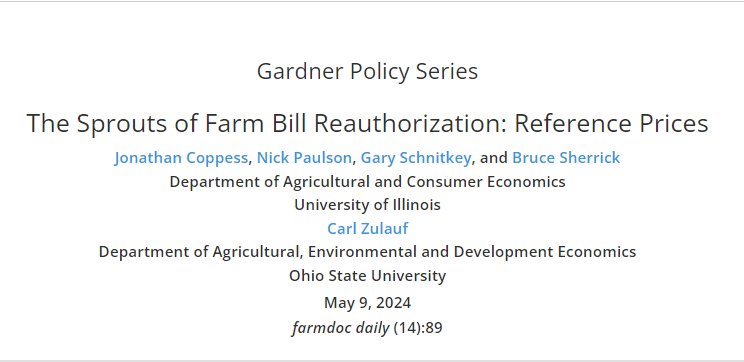
Farm Bill Update
The IL Corn Growers Association is neutral towards the House of Representatives' farm bill, the Farm, Food, and National Security Act of 2024.
Our latest farm bill letter written to Illinois members on the House Committee on Agriculture.
After an extension to the 2018 legislation in the fall of 2023, the House and Senate Agriculture Committees finally released their summaries of what Americans can expect in the next farm bill. Below we outline ICGA’s support, which includes many of our farm bill priorities, and concern for the House’s proposal.
House Proposal 
PROS/GOOD
-
The House’s current farm bill proposal protects our members’ number one priority, crop insurance. According to the University of Illinois’s farmdoc, about 90% of Illinois acres are covered by crop insurance. More information will emerge in the next week on the details of the crop insurance program and any proposed changes.
-
The summary in the House doubles funding for the Foreign Market Development (FMD) and Market Access Program (MAP). The programs see a $24.50 return for every dollar invested and have not seen funding increases since 2002. Improved support for MAP and FMD was a unanimous request by Illinois agricultural groups. This is a big step forward for the market development of corn.
-
A new addition to Title XII of the bill prevents other states from imposing standards similar to California’s infamous Proposition Twelve. The provision will protect farmers from complying with “a patchwork of state-by-state regulations” and does not allow state or local governments to regulate livestock production, for sale or consumption, outside state borders.
CONS/BAD
-
The current proposal in the House distorts and undermines the integrity of Title I, the commodity title of the farm bill in two ways:
-
Base Acre Issues- ICGA Policy Supports a Mandatory Base Acre Update
-
Support for the Commodity Programs (ARC and PLC) is determined by “base acres.” When prices are low, farmers receive funds according to the base acres originally established in the 1980-1983 growing seasons. Since the creation of the program, two voluntary update opportunities have existed for farmers to reallocate or change the crops within their enrolled base.
-
However, over the years, the gap between the reality of planted acres and enrolled base acres widens. For example, in 2024 the total amount of base acres eligible for peanut payments is 2.386 million acres. Over the past five years, the US has planted only 1.6 million acres on average. In fact, U.S. farmers haven’t planted more than 2.3 million acres of peanuts since 1951. Rice base acres for 2024 are 4.2 million acres, but farmers have never planted more than 3.8 million acres in a year.
-
In ICGA’s 2023 Policy Survey, over three quarters of members say they would rather see recently planted acres as opposed to historic base acres reflected in farm payment programs. ICGA’s policy supports a mandatory update.
-
-
Regional payment disparities are also an issue in the proposal. The House summary proposes a 10% to 20% reference price increase. As written, many southern farmers receive disproportionate support through reference prices when compared to midwestern farmers. Historically, reference prices are relatively higher for cotton, peanuts and rice, and lower for corn and soybeans. The University of Illinois’s farmdoc reports the 10% proposed corn reference price raise would result in an increase from $29 per base acre payment to $38 over a ten-year period. However, rice payments would jump from $58 per base acre to $140 over ten years. The same reference price increase for rice would cost more per acre over time because the program is more likely to “kick in” due to higher reference prices.
-
-
Lack of Bipartisan Intention
-
Over the last two years, leadership in both chambers declared in resounding union their desire to draft a bipartisan farm bill. However, the proposal in the House creates a clear partisan and regional divide. ICGA asks the House and Senate to create a bill that will be supported on both sides of the aisle and benefit all American agriculture.
-
Check back in to learn more before and after the House Agriculture Committee’s farm bill markup on May 23.









